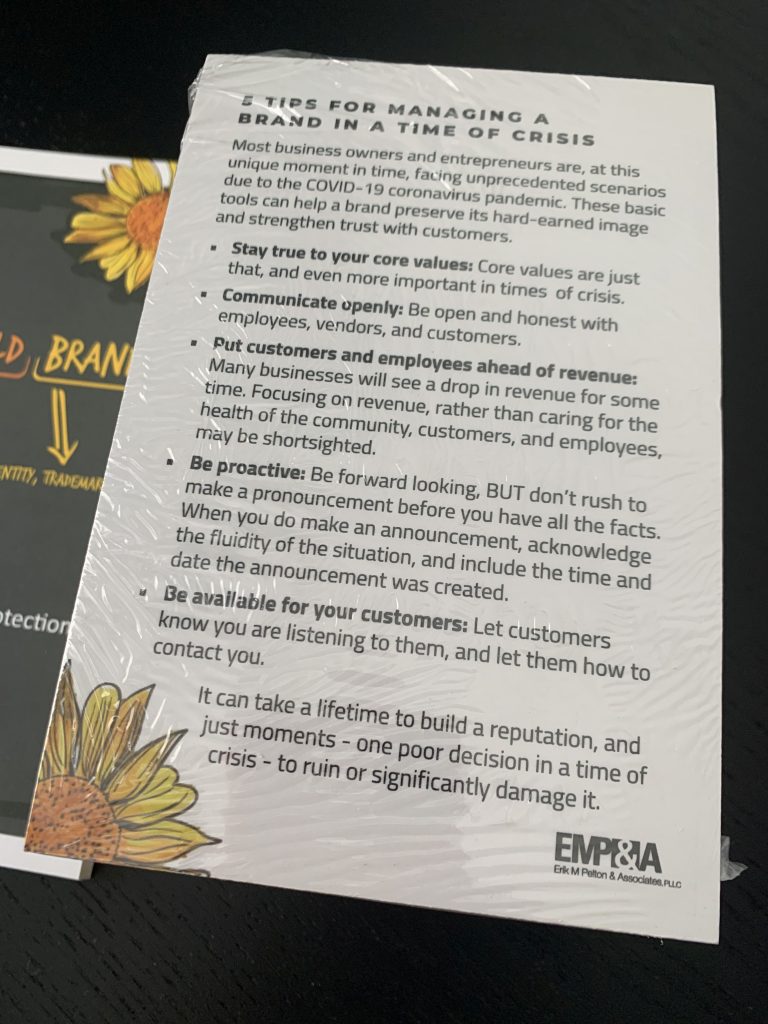The following is an edited transcript from Tricks of the Trade(mark) podcast. Listen to the full episode here.
We are still in the midst of a unparalleled crisis, not only in the United States but in many places around the world with the COVID-19, corona virus pandemic. As a result, I want to provide something as useful as possible for business owners and managers in this time of crisis, so I have put together a list of five tips for managing a brand in a time of crisis.
Every brand, whether it’s a restaurant, like my wife who’s an owner of two restaurants, or client and fried who is a real estate estate broker that I spoke to recently is facing challenges – at a minimum, facing changes in the way that they go about work with the protocols of social distancing and restricted travel.
These five tips I apply to any business, any size, anywhere, whether they’re online or physical. I wrote these after I read many newsletters and updates from many businesses that I interact with, from clients to law firms, associations, and companies I’ve shopped from. Many of them are doing a very nice job communicating and handling the crisis with their consumers and employees, but many of them I’ve been disappointed in, in their messages and focusing perhaps too much on how it’s affecting their operations and telling without providing any information that shows that there are also concerned about how their clients and customers are dealing with things and how they can be there to listen to them.
With that background, here are five tips to manage a brand in a time of crisis:
- Stay true to core values. I have a mission statement and a list of values that I made many years ago for the law firm and I re-visit it from time to time; they are the things that are our guiding principles. Most businesses have something like that. Now is the time when those things are tested and business owners and brand managers should look to them and focus on their core mission and core principles – anything else doesn’t really matter.
- Communicate openly. Be open and honest with your employees, with your vendors, with your customers, where possible. Tell them what you the business is going through, tell them about challenges. There are going to be financial implications, there are going to be delays, there are going to be inconveniences and much more. By communicate openly they won’t take anyone by surprise.
- Put customers and employees ahead of revenue. This is a challenge because many businesses are going to face a short term revenue crisis and a drop that could last for a considerable amount of time. But focusing on the needs and health of customers and employees in the end will serve the brand much better and is much more important. Focusing on some short term revenue to offer a gimmick or promotion is probably going to be shortsighted. I witnessed this firsthand: my wife had to close her restaurant preemptively before the state of Virginia made restrictions. She decided close one of her restaurants and move the other one to a “to go” only remodel. Closing the restaurant was extremely traumatic and emotional and difficult because those are employee’s livelihoods and families that are affected. But she did that because she knew it was the right thing for the customers and the employees and the community as a whole.
- Be proactive. When managing a brand in this time of crisis, look forward. However, don’t rush to make a pronouncement before you have all the facts. It’s key to make sure that you have as many facts as possible before making a decision and making an announcement or a communication. And when you do make an announcement or a communication, acknowledge that the situation is fluid and changing all the time, and I would recommend to include in any such communication the time and date that the communication was made, so that if circumstances change, one can always point to the fact that it was made based on the information available at that time.
- Be available for your customers. Make sure your customers know that you are there for them and you are listening to them. Let them know how to contact you. Set up special ways to communicate with them, whether it’s a special voicemail message or whether it’s a new way that they can reach out to you with information or questions. Make an FAQ on your website if necessary. Use social media and let them know that you’re also there to listen to them, what their concerns are, how you can help them. Make that part of any communication in this crisis.
It takes many years to build a solid reputation, but one poor decision or a series of poor decisions in a short amount of time can ruin a reputation, and in a crisis that is probably heightened because there’s so much stress involved in the decisions.
If you have any questions, comments, ideas, want to reach out to me and discuss any challenges that you’re going through or any thoughts about what I’ve said today, find me on social media, email me or you can always connect with me at erikpelton.com/connect.






Pingback: Inspiring small business adaptations in the midst of coronavirus | Erik M Pelton & Associates, PLLCErik M Pelton & Associates, PLLC